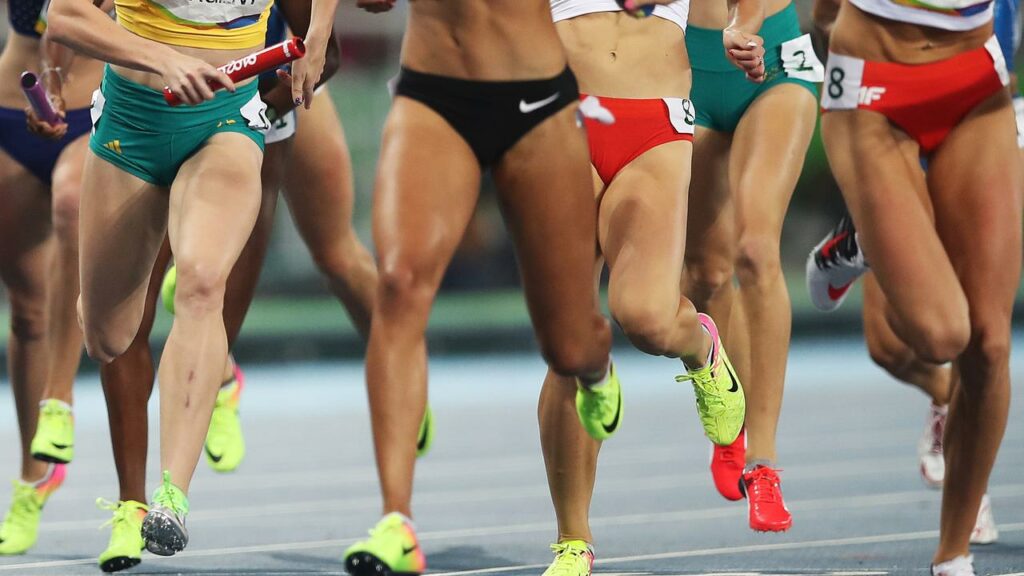Transgender ladies banned from feminine athletics occasions

[ad_1]
Lord Sebastian Coe, referred to as it decisive motion to guard females as World Athletics fell in keeping with swimming to ban transgender athletes from elite competitors.
Lord Sebastian Coe referred to as it decisive motion to guard the feminine class in athletics.
Though transgender athletes aren’t a problem in monitor and area on the elite stage in the intervening time, the game’s governing physique has fallen in keeping with swimming who led the way in which by implementing a ban 9 months in the past.
They did have fast issues with an American transwimmer Lia Thomas declaring a need to swim on the Olympic trials in 2024.
Coe, the World Athletics president, stated there had been session with stakeholders together with the Worldwide Olympic Committee and nationwide federations concerning the problem of transgender athletes.
“Nearly all of these consulted said that transgender athletes shouldn’t be competing within the feminine class,” he stated.
“The judgement we took . . . was, I consider, in the perfect pursuits of our sport.
“We’re not saying ‘no’ eternally,” he stated, including {that a} working group headed by a transgender particular person could be created to additional monitor scientific developments.
The vote, which handed with a 71 p.c of nationwide federations in favour, declared transgender athletes who’ve transitioned from male to feminine after going by puberty received’t be allowed to compete.
World Athletics additionally introduced that Russian athletes will stay barred from monitor and area “for the foreseeable future” due to the nation’s invasion of Ukraine.
What had turn into the extra urgent problem for athletics was the state of affairs with DSD athletes – they’ve male chromosomes and inside testes however have been raised as ladies since start – who had been competing usually, and profitable, at an elite stage for a while.
These embody two-time Olympic 800m champion Caster Semenya with the council voting to tighten restrictions on them, slicing the utmost quantity of plasma testosterone for athletes in half, to 2.5 nanomoles per litre from 5.
They’d beforehand tried to limit the vary of occasions the DSD athletes might compete in, barring them from operating in races from 400m as much as 1500m.
Semenya had been making an attempt to compete in longer occasions – she completed thirteenth within the heats of the 5000m ultimately 12 months’s world championships.
To compete at subsequent 12 months’s Paris Olympics, she must bear hormone-suppressing therapy for six months, one thing she has stated she’s going to by no means do once more, having undergone the therapy a decade in the past underneath earlier guidelines.
Whereas Semenya is likely one of the sport’s greats, the tightening isn’t about her given she is within the twilight of her profession. There are 12 different DSD athletes competing on the elite stage and so they had proven in current occasions the restriction of occasions was not a problem.
Eyebrows have been raised when Burundian Francine Niyonsaba – who completed runner-up to Semenya within the 800m on the 2016 Rio Olympics – received the 2021 Diamond League 5000m last whereas there was once more uneasiness when Christine Mboma claimed the silver medal within the 200m on the Tokyo Olympics.
These have been the outcomes which have been making the world governing physique nervous. Now with the tightening of DSD restrictions – they’ve to cut back their testosterone ranges beneath 2.5 for not less than six months to have the ability to compete deliberately – means it’s very unlikely they are going to function in Paris.
The transfer has been welcomed in Australia with main middle-distance coach Nic Bideau saying it was unfair for different feminine opponents on the elite stage.
“No-one has an issue on the leisure stage, no-one understandably complains there however whenever you’re competing for cash and worldwide status it’s not honest,” he stated.
“It’s clear watching a few of these races that some athletes have an enormous bodily benefit.”
Having a stage taking part in area in athletics has at all times been the game’s biggest problem given the litany of drug scandals all through its historical past.
And whereas that’s nonetheless very a lot an on-going battle, the banning of transgender athletes is a big step in the precise path.
Trans ban: International ruling ‘to guard feminine sport’
Transgender ladies will not be allowed to compete in feminine monitor and area occasions no matter their ranges of testosterone, World Athletics president Sebastian Coe stated, citing equity over inclusion.
Coe stated no feminine transgender athlete who had gone by male puberty could be permitted to compete in feminine world rating competitions from March 31.
Talking after a gathering of the worldwide monitor and area federation’s decision-making physique, Coe stated World Athletics had consulted with stakeholders together with 40 nationwide federations, the Worldwide Olympic Committee and trans teams concerning the problem of transgender athletes.
“Nearly all of these consulted said that transgender athletes shouldn’t be competing within the feminine class,” he stated.
“Many consider there may be inadequate proof that trans ladies don’t retain benefit over organic ladies and wish extra proof that any bodily benefits have been ameliorated earlier than they’re keen to think about an possibility for inclusion into the feminine class.”
He added: “The judgement we took … was, I consider, in the perfect pursuits of our sport.
He stated a working group headed by a transgender particular person could be created to additional monitor scientific developments.
“We’re not saying ‘no’ eternally,” Coe stated.
“Choices are at all times tough after they contain conflicting wants and rights between completely different teams, however we proceed to take the view that we should preserve equity for feminine athletes above all different concerns.
“We shall be guided on this by the science round bodily efficiency and male benefit which is able to inevitably develop over the approaching years. As extra proof turns into obtainable, we’ll evaluate our place, however we consider the integrity of the feminine class in athletics is paramount.”
In a press release, World Athletics stated it grew to become obvious that there “little assist inside the sport” for an possibility that was offered to stakeholders, which required transgender athletes to keep up their testosterone ranges beneath 2.5nmol/L (nanomoles per litre of blood) for twenty-four months to be eligible to compete internationally within the feminine class.
“There are at the moment no transgender athletes competing internationally in athletics and consequently no athletics-specific proof of the affect these athletes would have on the equity of feminine competitors in athletics.
“In these circumstances, the Council determined to prioritise equity and the integrity of the feminine competitors earlier than inclusion.”
World Athletics additionally amended laws protecting athletes labeled as DSD, in different phrases having “variations of sexual growth”.
Probably the most high-profile DSD athlete is double Olympic 800m champion Caster Semenya of South Africa.
Below the brand new laws, with a purpose to compete within the feminine class, DSD athletes must cut back their quantity of blood testosterone to beneath 2.5 nanomoles per litre, down from the present stage of 5, and stay beneath this threshold for 2 years, moderately than only one, as is the case now.
World Athletics additionally eliminated the precept of restricted occasions for DSD athletes, that means laws now cowl all occasions moderately than the beforehand monitored ones, which have been from 400m to at least one mile.
Initially revealed as Transgender ladies banned from feminine athletics occasions
[ad_2]
Source_link




